Review: LSPR Teatro's First Original Spectacle DIVA Promises a Bright New Era
The first original production by LSPR Teatro gleams with potential
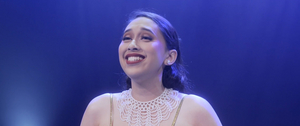 Diva, the latest offering from LSPR Teatro, premiered on December 10, 2021 at Cinépolis Plaza Semanggi. It was a momentous production for the theater club, being both their first original musical and their first cinematic show. Though not without obvious shortcomings, the tragic showbiz cautionary tale was nevertheless both enjoyable and impressive for its ambition.
Diva, the latest offering from LSPR Teatro, premiered on December 10, 2021 at Cinépolis Plaza Semanggi. It was a momentous production for the theater club, being both their first original musical and their first cinematic show. Though not without obvious shortcomings, the tragic showbiz cautionary tale was nevertheless both enjoyable and impressive for its ambition.
Diva tells the story of the Scarlett Hilton (Giena Putri), a young woman with a golden voice who lives the slow life in a small Americana town with her mother, Susie Hilton (Geta Gwyneth). Beyond her humble church-going upbringing, Scarlett dreams of becoming a star and shares the songs of her late father with the world.
One day, New Yorker producer Yvonne Downes (William Rachmandani) comes to watch Scarlett's performance at her church's choir. Seeing the star potential inside her, he convinces Susie to let Scarlett (who was more than eager) go with him to New York City. Scarlett departs, leaving both her mom and her supportive childhood friend, Samuel Montgomery (Jason Sebastian).
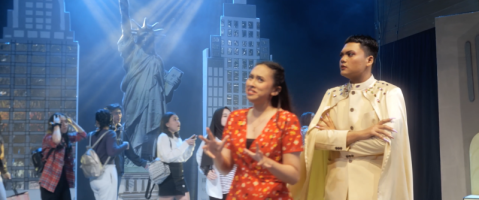
Yvonne's producorial instincts are quickly proven to be true with Scarlett's meteoric rise to stardom. Unfortunately, Scarlett does not only catch the attention of music lovers nationwide, but also the eye of one Antoine Martel (Dimas Rehand Arends) - a titan in the showbiz industry who hides a nasty side.
Under Antoine's influence, Scarlett takes on a more mature, sensual image on stage. Yet, her glamorous persona hides a darkness off stage, as the sleazy businessman coerces Scarlett to enter a relationship with him, one that's both exploitative and violent. As the man himself puts it, "This is how the industry works."
Not long after, Scarlett finds herself overwhelmed by both the glitzy celebrity life and the destructive underside, leaving her little time to contact neither Susie nor Samuel. The concerned Susie makes a surprise visit to Scarlett, but the reunion quickly turns sour as Susie expresses her disapproval of Scarlett's ruinous life.
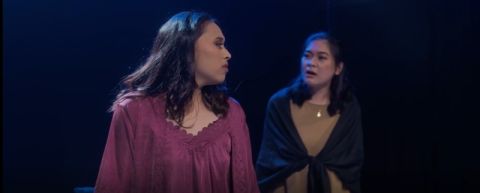
Susie is not the only one trying to get back into Scarlett's life; Sam also seeks to make his way towards Scarlett by building his photography career. He eventually becomes renowned enough to get in touch with Scarlett. Their reunion lights a familiar feeling in Scarlett's heart.
Unfortunately, things get worse for the star. Not only does the increasingly bold image change scandalize her fanbase, but she learns that she's carrying Antoine's baby. Antoine tells Scarlett to lose the baby, but she insists on keeping it and leaving him. To keep Scarlett in check, the unhappy Antoine threatens to ruin Sam's reputation.
Scarlett comes to Sam, who tries to convince Scarlett to run away with him. Bound by Antoine's threat, Scarlett refuses. She then tries to call Susie, who doesn't even recognize her daughter's voice.
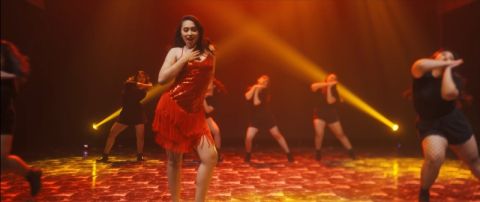
The scene cuts to a showstopper performance - Scarlett's final, according to the announcer, clad in an impressive golden dress. After the song ends, we see the cast and ensemble in black, mourning for Scarlett's death at 27. The principal cast each shares their eulogy and as the final song ends, the credit rolls.
The credit claims the story to be inspired by the biographies of Britney Spears and Marilyn Monroe, and it's easy to see how. The tragic dark side of show business that is retold here would indeed feel familiar to those well-acquainted to the entertainment industry, or shows that draw from them (think Dreamgirls or SMASH).
The screenplay is penned by a team of three: Andika Aryaputra, Annastasya Alifah Sugiarto, and Geta Gwyneth (who also played Susie Hilton). While choosing a straightforward and recognizable premise is quite likely a wise decision for LSPR Teatro's first original affair, the story itself unfortunately doesn't quite offer any new insight nor angle. The characters and story beats are perhaps a bit too familiar and predictable (that is, until the mid-credit scene).
Other than the predictability, the latter half of the story also had tonal issues. Events kept spiraling down for Scarlett, with all her agency and support taken away from her, making everything quite miserable to watch. Although this was, perhaps, the intended effect, it made the final number quite confusing, as everyone seemed to have nothing but good things to say about Scarlett, even Antoine, her abuser. It might have worked better if the hypocrisy was called out, but it was played straight, and it gave the same narrative treatment to the statements from Susie, Yvonne, Antoine, and Sam, muddling any intended message.

Interestingly, the aforementioned mid-credit scene revealed that Scarlett faked her death and now lives with Susie, Sam, and her child. Although it was not lacking in the surprise factor, there was little build-up and, as a result, the relatively happy resolution felt unearned, if not bizarre.
More time could've been allocated to dissect how the characters reached this resolution, since there is a potential for interesting character arcs there - for example, how Scarlett comes to fake her own death, how Sam finally forgives Scarlett, how Susie reconnects with her daughter, and if Yvonne finally stands up to Antoine and helps them. And if we're talking happy endings, some sort of comeuppance for Antoine would be appreciated as well.
Despite the show's title, Scarlett as the Diva in question ironically did not get enough spotlight as her role deserves. A lot of scenes are dedicated to other characters commenting or thinking of her, yet we learned little of her own thoughts and feelings after she was brought to New York, thereby lessening the effect of the show's more emotional moments, which are all tied to her. Making the script more streamlined and focused would've helped it immensely.
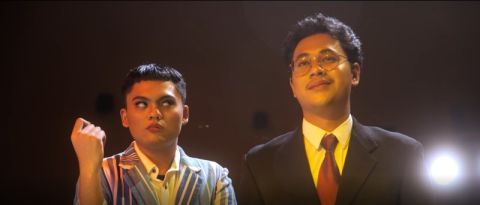
Another thing of note was the choice to set the story in the United States, instead of Indonesia. Though it might come from the fact that the USA is still the world's leading hub for entertainment, and especially of the depravity portrayed here, one cannot help but wonder if it could've been interesting to have a local setting for the story instead, where local values and conflicts might have infused more flavor to the "small town girl becomes a star and regrets it" plot.
Although still with its imperfections, it should be noted that Diva was written by a group of students. Finishing a whole script is in itself quite a momentous achievement. Should the writers band together to write a new show, with more study, research, and editing to even out the kinks, it would be a joy to see their next work. There is nowhere to go but up.
The direction for the show was also led by a team of three, this time consisting of Andika Aryaputra, Fatinka Eman, and Ben Saragih. The show retained LSPR Teatro's theatrical roots, being shot on a stage. It was a good mix between stage and film, allowing the audience to more closely see gestures and expressions with the camerawork while retaining the dramatic language of a stage play.
As for the cinematography (by Tyrone Thomas Rizmara), Diva is mostly a beautifully shot film. There's a lot of interesting camerawork and transition, complete with beautiful framing. However, as the film goes on, it becomes obvious that there's perhaps some sort of limitation that made the variety of framing quite limited. It's especially apparent with scenes with a lot of cast, usually keeping to half-body shots or closer, making the show feel a bit constrained at times. Moreover, the sound mixing could've used some more work to make everything sound more balanced.

The production design (set design by Annastasya Alifah Sugiarto, costume stylist led by Devasya Maharani, make-up by Rachel Najwa Syauqi) is altogether satisfactory. There's a marked difference between the small town and New York scenes which helped deliver the story and characters. A standout set piece was the New York backdrop (complete with a miniature Statue of Liberty!) that really sold the grandioseness of the metropolis.
On the acting front, it was evident that the directors and the cast members put a lot of work into Diva. Each cast member, principal or ensemble, played their part with laudable commitment and it helped in drawing in the audience to the story.
Still, there are some stand-outs among the cast. Namely, Geta Gwyneth's turn as Susie stole the show, hitting every dramatic note with aplomb. Although all the cast are in a similar age range, her interpretation of a concerned mother was truly impressive and could stand on even footing with some older actresses in similar roles, or even better.
Dimas Rehand Arends, who played Antoine, was also similarly impressive. He successfully brought to life the truly heinous character, who's mentally, verbally, and physically abusive. He played it so truthfully that it was hard not to hate the character - a good thing, in this case (although it was a shame that the character as written ended up without more depth).

As for Giena Putri, who played the titular diva, she put up a satisfying performance. Her strength lies in the more subtle scenes when she was simply Scarlett, a daughter and a friend, as she could portray the feeling of being lost and uncertain quite well. When it comes to performing on stage as the beloved superstar, she could have a little bit more confidence and fierceness to really sell the character's star factor.
One interesting thing to note was the diction of the actors. Some actors used very heavy (and mostly well-delivered) accents, while others opt to use relatively neutral accents. Some also delivered their lines more clearly than others. While this is a minor aspect in the grand scheme of things, it still feels off at times when two characters are having a conversation with wildly different levels of clarity in diction.
The heart of every musical is its songs. Being the first original production, it's more imperative than ever for the show to have great and memorable songs. Fortunately, the team of Felita Kezia, Gerardo Tanor, and Thirza Ariella did not disappoint.
There's a great variety of songs in the soundtrack, from solos to duets to crowd songs. Each song feels professionally made, with decent-to-great melody and lyrics. Although some songs might sound familiar (once again owing to the genre chosen for the show), they all add, and not detract, from the story being told. One number that stands out the most has to be Scarlett's final performance, a powerhouse number that's both grand and rife with emotional potential.
The choreography, by choreographer Gisella Almayda Laluan (and assisted by Novenda Charity Muljono), is competent. There aren't a lot of dance numbers, but they're pleasant enough to sit through and make good use of the sizable ensemble cast. A standout moment is a number by Antoine where he and a group of male dancers toy with Scarlett in a series of horrifying but hypnotizing movements.
Altogether, Diva is still an impressive showing for LSPR Teatro, especially considering it's their first original show and their first filmed show. Though the story could've been stronger and more impactful, the dedication from everyone involved is apparent and greatly appreciated. While Scarlett Hilton's story has ended, it will hopefully open the door to many more original and intriguing stories from the promising students of LSPR Teatro.
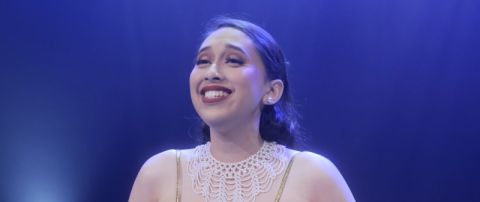
Reader Reviews

Videos

